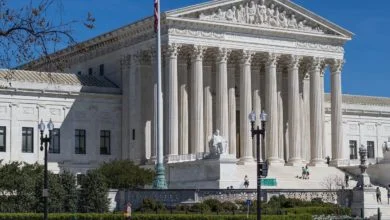Study: Trump Must Wrestle With Burdensome Environmental Regs Before Fixing US Infrastructure
by Tim Pearce
Overly expansive and redundant environmental reviews are adding years onto infrastructure projects’ completion time and holding up key maintenance, according to the Manhattan Institute.
The 1970 National Environmental Policy Act (NEPA), sometimes referred to as the Magna Carta of environmental law, has placed major infrastructure projects on hold for more than half a decade on average, according to a Manhattan Institute study released Friday.
NEPA requires federal agencies to review the potential economic, environmental and social impacts of any project that is connected with the federal government, either through funding or property.
The vast majority of NEPA reviews are catalogued as categorical exclusions, which only take a few days to complete. Another 4 percent of reviews are Environmental Assessments (EA) taking somewhere between four and 18 months.
While only 1 percent of NEPA reviews require an Environmental Impact Statement (EIS) reserved for the largest projects, each review took 5.1 years on average to complete in 2016, according to the study.
“The NEPA environmental review process is broken,” James Coleman, a professor of energy and natural resources law at Southern Methodist University Dedman School of Law, told the House Natural Resources Committee at an April hearing. “We have lost decades of investment while environment reviews grow longer and longer.”
President Donald Trump has proposed capping an environmental reviews time limit to two years.
NEPA has been reformed several times since its implementation but needs constant changes to stay relevant. Agencies should take a more active role in exempting projects for which the current law is outdated, according to the study.
NEPA compliance accounted for nearly 30 percent of the deployment cost of setting up 5G cell networks. Prior iterations of cellular networks required large towers, but 5G only needs a shoebox-sized box fixed to a building. Each of the thousands of 5G cells required EAs though they make a tiny percent of the impact of a large cell tower. Earlier this year, the Federal Communications Commission ruled that private parties could install 5G boxes without major reviews.
Agencies can petition for “categorical exclusions” for activities that have already been repeatedly studied and approved. A single agency’s exclusion cannot be used by another agency, however, causing some exclusions to be applied for multiple times. Allowing exclusions to be shared between agencies would cut down on bureaucratic costs and wasted time, the study says.
Localizing more of the environmental review process or allowing states to drive projects through the review process has proven to reduce the time the review process takes. Programs like NEPA Assignment, which allows states to guide priority projects through reviews, should be expanded.
“With the implementation of these recommendations, federal agency resources would be freed to deal with the complex projects that require more comprehensive review, reducing the time for projects that pass muster to begin,” the study says.
Content created by The Daily Caller News Foundation is available without charge to any eligible news publisher that can provide a large audience. For licensing opportunities of our original content, please contact licensing@dailycallernewsfoundation.org





